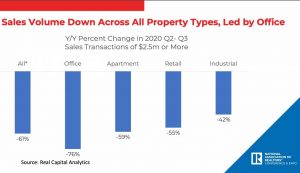But the problems in retail may be catching up to multifamily.
Softness in urban multifamily shows up in many places, but new lease-ups, which are coming on the market at a bad time, could be most exposed and have a major impact on the valuation of assets. Data and market research show suburban and urban new lease-ups around the country are not performing great, however, investors might see more opportunity to make buys in that.
Since some of the workforce housing is struggling more than some of the white-collar housing because of unemployment, the markets are seeing high vacancies, delinquencies, and collection loss.
We may see more issues if these middle-income apartment complexes are smaller, as landlords may face obstacles if they’re overleveraged or have very small buildings where having a few tenants not paying can be very impactful.
The coronavirus will continue to create a unique set of challenges for multifamily operators and investors for the foreseeable future. However, where there are changes and disruption, there is also opportunity.
Are commercial properties taking longer to sell?
Selling during this pandemic requires creativity, tech savvy, meticulous planning and an understanding of how buyers’ needs have changed. That’s why We (The Seymour Group) always initiate a multi-pronged approach to virtual marketing that incorporates sales management platforms; “dynamic marketing” using brochures, websites and e-blasts; and advertising on social media. We are seeing South Korean investors emerging as some of the most-aggressive buyers of U.S. commercial real estate during the Covid-19 period. In the first nine months of the year, Korean investors accounted for 8.6% of all overseas investment in U.S. commercial real estate, up from 3.7% a year earlier, according to Real Capital Analytics. With that in mind, we also incorporate an aggressive campaign to international investors through numerous syndication platforms – translating all of the property details in over 30+ languages for each platform.
Undeniably, the recovery of the industry from the effects of COVID-19 may take some time. However, those who are shifting their approach in how to sell and market commercial assets will aid in advancing the real estate market’s comeback.
